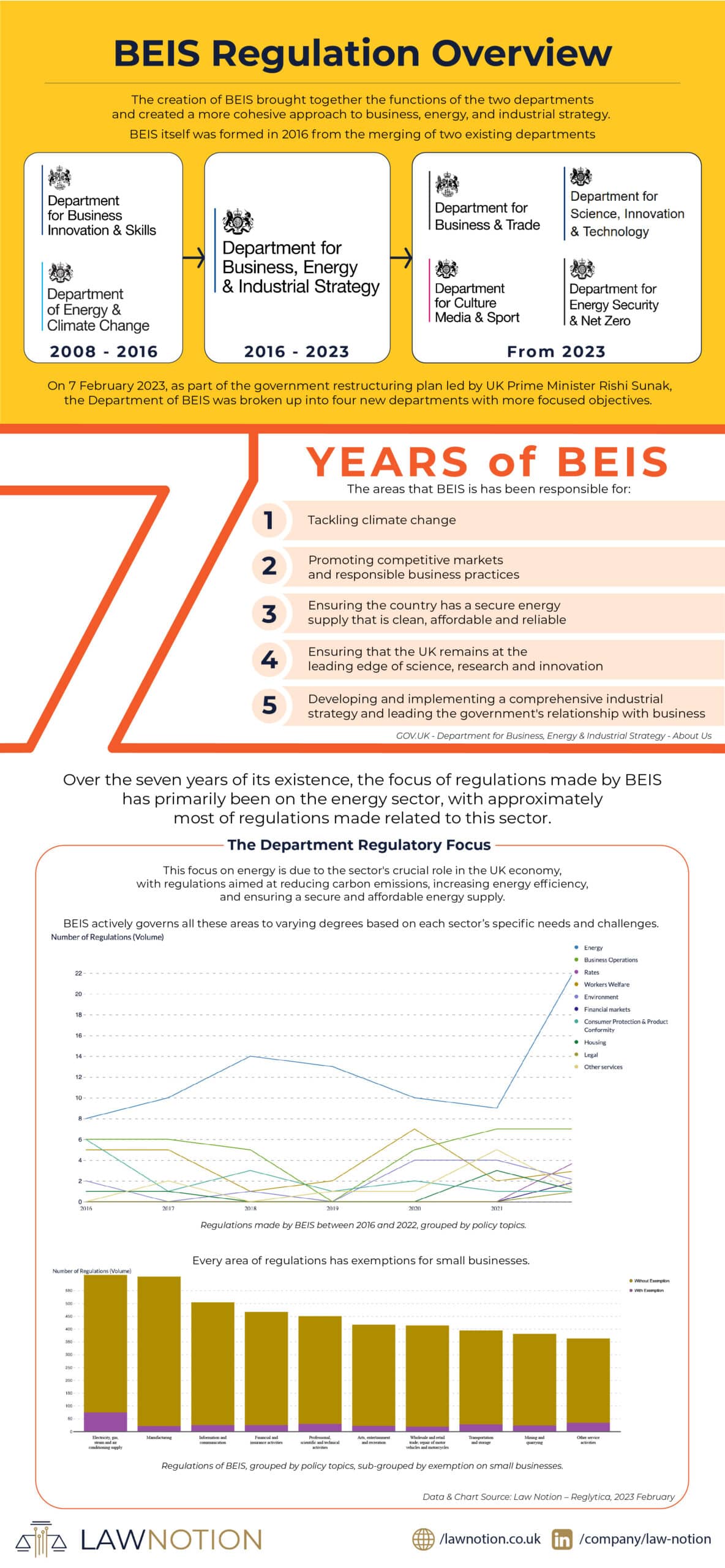
The Department for Business, Energy and Industrial Strategy (BEIS) was a government department in the United Kingdom. It was formed in July 2016 after the decision to leave the EU and the subsequent machinery of government change. The department’s main objective was to create a competitive business environment in the UK and to encourage economic growth through innovation, investment, and the promotion of clean energy.
BEIS itself was formed from the merging of two existing departments: the Department for Business, Innovation, and Skills (BIS) and the Department of Energy and Climate Change (DECC). BIS was responsible for business policy and innovation, while DECC was responsible for energy policy and climate change.
The merges of BIS and DECC was part of the UK government’s plan to streamline the number of government departments and reduce costs. The creation of BEIS brought together the functions of the two departments and created a more cohesive approach to business, energy, and industrial strategy.
Here are the responsibilities that BEIS has governed in the last seven years:
- Developing and implementing a comprehensive industrial strategy and leading the government’s relationship with business
- Ensuring that the UK remains at the leading edge of science, research and innovation
- Ensuring the country has a secure energy supply that is clean, affordable and reliable
- Tackling climate change
- Promoting competitive markets and responsible business practices
The BEIS New Departments
On 7 February 2023, as part of the government restructuring plan led by UK Prime Minister Rishi Sunak, the Department of BEIS was broken up into four new departments with more focused objectives.
- The Department for Business and Trade (DBT) – will be a single, consistent voice for business within the government, focused on boosting the economy through better regulation, new trade deals abroad, and a renewed entrepreneurial culture at home.
- The Department for Science, Innovation and Technology (DSIT) – will ensure the UK is where the next great scientific discoveries are made, where the most innovative minds and ambitious entrepreneurs will convert those ideas into products and services that may change the world.
- The new Department for Energy Security and Net Zero (DESNZ) – will focus on giving the UK cheaper, cleaner, more secure energy sources. (cutting bills, emissions, and our dependence on international energy supplies)
- And the Department for Culture, Media and Sport (DCMS) – will streamline and refocus on supporting our cultural and creative industries to thrive.
These changes will go into effect immediately, with ministerial and official leadership in place and each department holding a set of priority objectives. The transition programme will be completed over the next few months, focusing on minimising disruption to ongoing delivery.
Kemi Badenoch, the new Business and Trade Secretary, will lead a combined Department for Business and Trade. It aims to promote growth by assisting British businesses at home and abroad, encouraging investment, and empowering free trade.
Michelle Donelan, the former Culture Secretary, is the new Science Secretary in charge of the new Department for Science, Innovation, and Technology, which will take over science and technology-related activities. The department will drive the innovation that will deliver improved public services, create new and better-paid jobs and grow the economy.
Former Business Secretary Grant Shapps will lead a new Department for Energy Security and Net Zero. The department has been tasked with ensuring long-term energy supply, lowering bills, and cutting inflation in half.
Lucy Frazer, the Member of Parliament for South East Cambridgeshire, will lead a refocused Department for Culture, Media, and Sport (which will lose responsibility for the Digital Sector). The change has made Frazer the thirteenth Secretary of Culture in the past thirteen years.
Regulation Overview BEIS played a crucial role in ensuring the UK has a green and prosperous future. The past year has been a tremendous change, as the department has taken a leadership position in addressing the major challenges of juggling multiple responsibilities and priorities. Let’s look at some insight into the outcome of the priorities.
The Department Regulatory Focus
BEIS was responsible for creating and implementing regulations that impact businesses and industries in the country. The chart highlights the various topics that BEIS governs, ranked in order of volume from high to low. The cases are Energy, Business Operations, Education, Consumer Protections & Product Conformity, Worker’s Welfare, Financial Markets, Telecommunications & broadcasting, and so on.
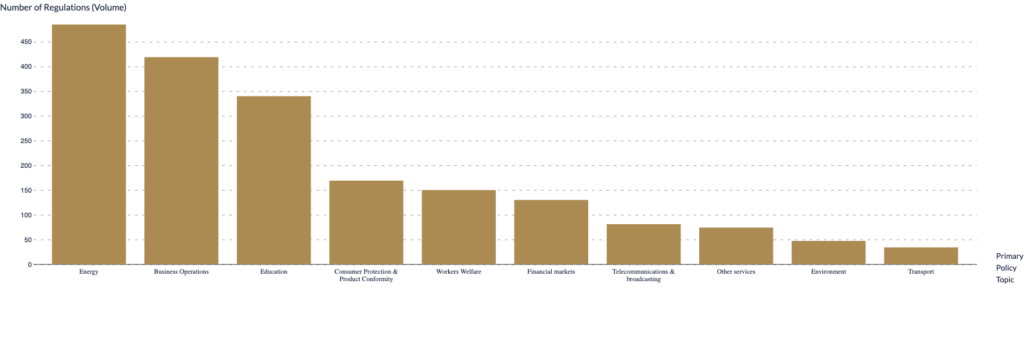
It appears that the focus regulations made by BEIS over the seven years of its existence have been related to energy. This suggests that the department has placed a significant emphasis on regulating the energy industry, possibly due to the importance of this sector in the UK economy, such as reducing carbon emissions, increasing energy efficiency, and ensuring a secure and affordable energy supply.
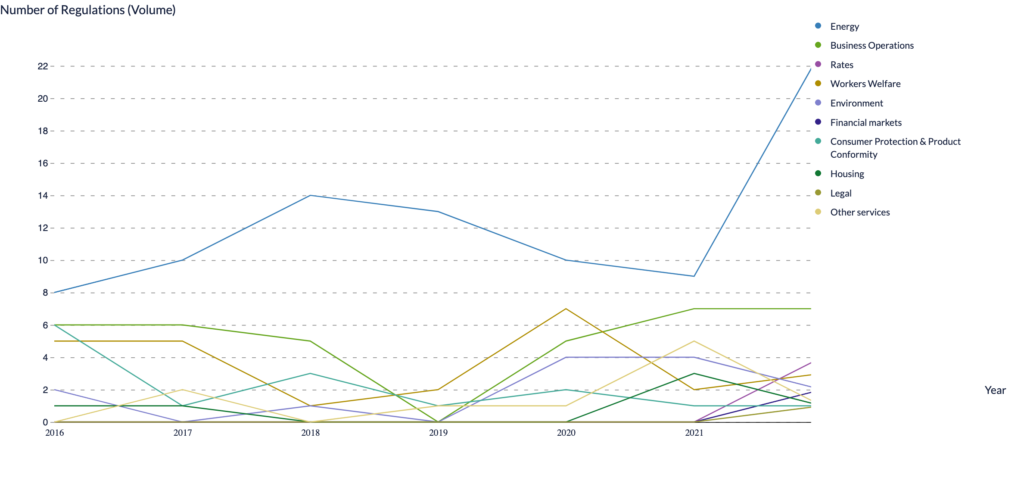
It’s worth noting that while energy may be the most heavily regulated topic by BEIS, this doesn’t necessarily mean that other areas of regulation are less important or receive less attention. BEIS likely governs all these areas to varying degrees based on each sector’s specific needs and challenges.
Focus on alleviating regulatory burdens on small businesses
BEIS was committed to reducing the regulatory burdens on small businesses, as demonstrated by its regulations that exempt certain aspects of the regulations for small businesses in key sectors, such as Electricity, Manufacturing, and Information.
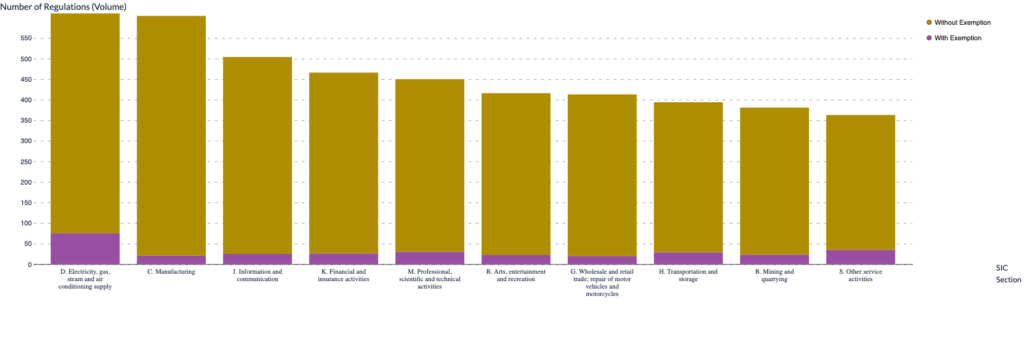
Suppose we were to compare the small businesses exemption perspective from other departments. For example, if we look at regulations on energy made by different departments, BEIS has the most significant proportion of regulations that help alleviate the regulatory burdens of small businesses.

Most BEIS regulations apply across all four UK Regions
As shown below, most of the regulations that BEIS governed apply across all four UK Regions (i.e. England, Scotland, Wales, and Northern Ireland) across different sectors:
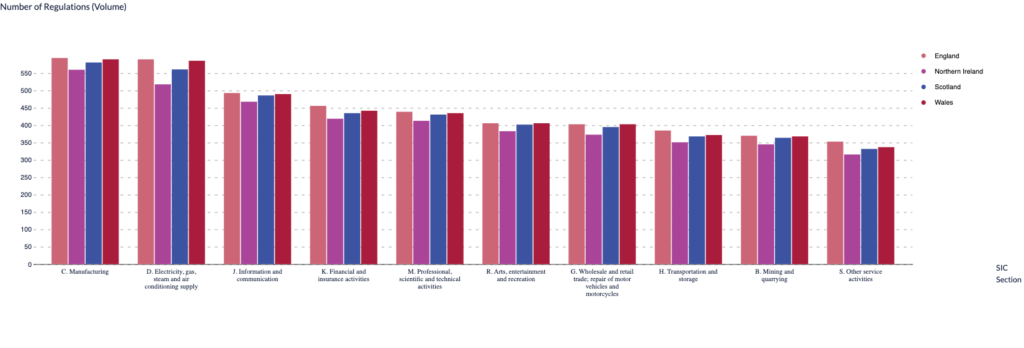
Complexity & Penalty
In addition to just looking at the sheer regulation volumes (as described above), if we analyse them incorporating some complexity element (e.g. the number of regulatory requirements inside the regulation, the level of complexity to understanding the needs etc.). For example, we could see that among the regulations that BEIS governs, the total volume of regulations about Education is larger than those of Consumer Protections & Product Conformity (almost double!). Still, the complexity is much lower than the Consumer Protections & Product Conformity ones.
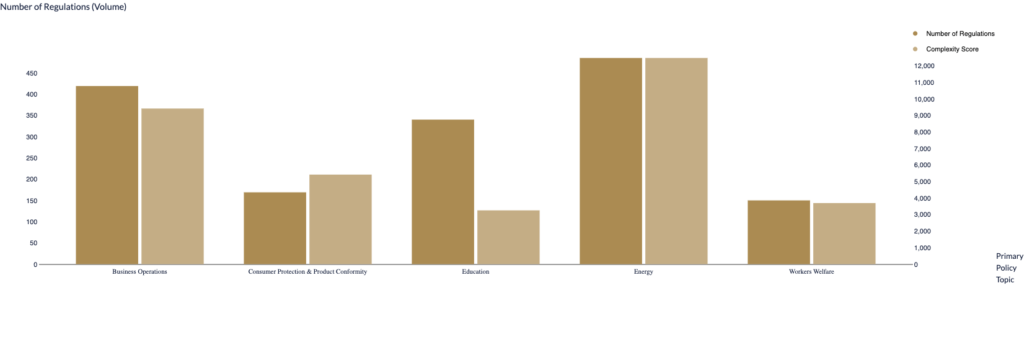
Another angle to look at are the penalty, as shown in the below chart, among regulations that BEIS governed. For example, the total volume of Energy regulations is the highest but almost the least on the penalty severity level. In contrast, those for Business Operations, Education, Consumer Protection & Product Conformity and workers’ welfare have a higher level of penalty for non-compliance.
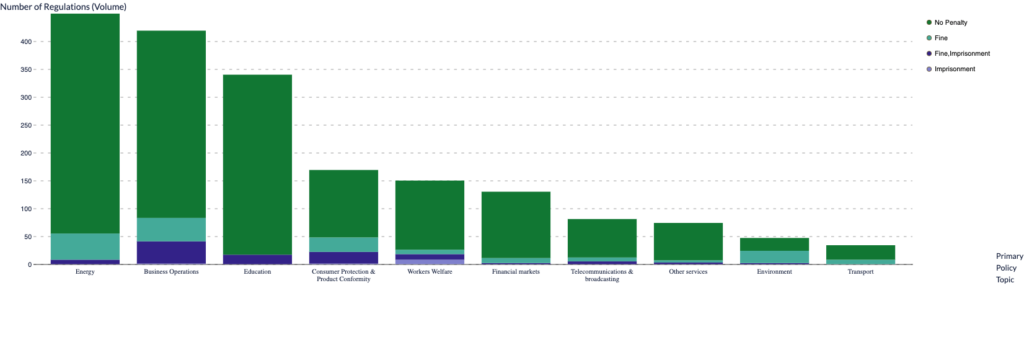
Take away
The creation of the new department in the UK highlights the government’s commitment to ensuring a thriving economy while addressing the challenges in innovation, investment, and the promotion of clean energy. It also emphasises that the new regulation has significant implications for policymakers responsible for policy reform. As a policymaker, it is essential to understand the regulatory landscape and the potential issues that can arise from it.
By using Law Notion’s regulatory technology, policymakers can easily identify the regulatory burdens on businesses across different aspects. This can help policymakers in the government department assess the potential impact of the regulation and identify where changes can be made to improve the regulatory landscape.
Law Notion – Reglytica provides policymakers with an evidence-based approach to policymaking by providing detailed insights into the regulation. With Reglytica, policymakers can allocate resources efficiently, identify potential issues in their regulations and propose changes that will help improve the regulations affecting businesses, sorted by sector, area, and region.
Contact Law Notion and consider utilising Reglytica to enhance the regulatory landscape. By leveraging this technology, policymakers can ensure that their proposals are informed by the most up-to-date data and analysis, resulting in a more effective and efficient regulatory landscape.
